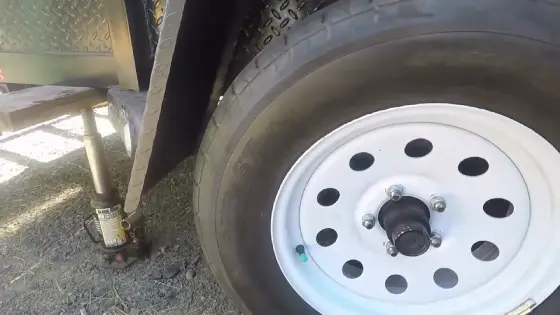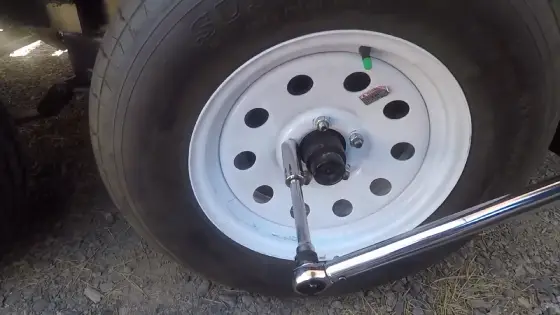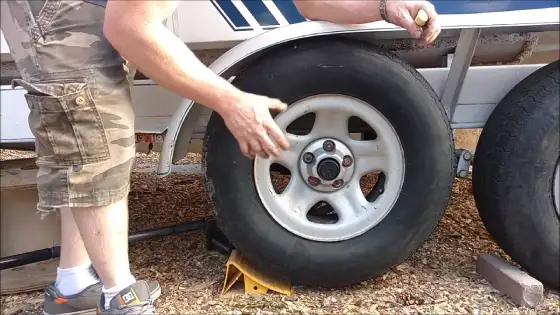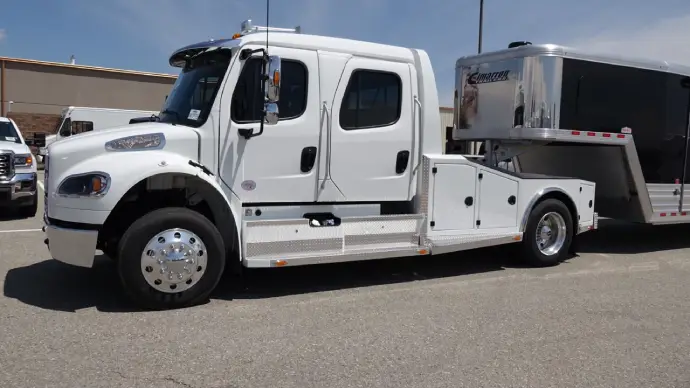Last Updated on July 26, 2023
You probably know how important it is to maintain your trailer. One crucial aspect of trailer maintenance is tire balancing. But do trailer tires need to be balanced?
Balancing your trailer tires is crucial to ensure a smooth ride and prevent any unwanted movement. Properly balanced trailer tires contribute to improved braking performance and control while towing.
Balanced tires reduce vibrations and maintain consistent contact with the road surface, which enhances the overall handling of the trailer and makes it easier to maneuver, reducing the risk of accidents.
But why is tire balancing so important, and what happens if you neglect it? We will answer these questions and provide you with all the information you need to know about trailer tire balancing.
Why Do Trailer Tires Need to Be Balanced?

Balancing your trailer tires will have a significant impact on your overall performance, tire longevity, and safety. Here’s why:
- 1. Improved Performance
- 2. Extended Tire Longevity
- 3. Enhanced Safety
- 4. Minimized Damage to Trailer Components
- 5. Fuel Efficiency
Let’s talk in more detail.
1. Improved Performance
With balanced trailer tires, you’ll enjoy a smoother, more stable towing experience that enhances your overall performance on the road. This means that you’ll be able to maneuver your trailer more easily, even at high speeds.
Eliminating vibrations and uneven weight distribution allows for a more controlled ride, reducing the risk of accidents and damage to your vehicle.
Moreover, balanced trailer tires minimize hopping, wobbling, and bouncing, which can cause wear and tear on your vehicle’s suspension system.
This translates to fewer maintenance costs in the long run. Additionally, balanced tires reduce fuel consumption, as your vehicle will not have to work as hard to maintain stability.
2. Extended Tire Longevity
By ensuring your trailer tires are properly balanced, you can keep them in good shape for the long haul, giving you more bang for your buck and putting you in the driver’s seat to get the most out of your investment.
With balanced tires, the weight distribution is even across the tire, meaning each part of the tire wears down at the same rate. This even wears pattern leads to extended tire longevity, reducing the need for frequent tire replacements and saving you money in the long run.
Furthermore, balanced tires also provide a smoother ride for your trailer, reducing the risk of damage to your cargo and ensuring a safer journey for you and your passengers.
Unbalanced tires can lead to vibrations and bouncing, which can cause your cargo to shift and potentially cause damage or even a full-on accident.
3. Enhanced Safety
Ensuring that your trailer tire balance is up to par is crucial for your safety on the road. Unbalanced trailer tires can cause steering wheel vibrations and instability, which can lead to driver fatigue and even accidents.
The added weight of the trailer can make these issues even more dangerous, so it’s important to take extra precautions when towing.
Balancing your trailer tires reduces the risk of these issues, providing enhanced safety while on the road. It’s important to have your trailer tires balanced regularly to ensure that they’re in good condition. If you notice any unusual vibrations or handling issues while towing, it’s important to have your tires checked immediately to prevent any potential safety risks.
4. Minimized Damage to Trailer Components
Now that you understand how balancing your trailer tires can enhance safety, it’s essential to consider how this maintenance task can also minimize damage to your trailer components.
Unbalanced tires can cause excessive stress on various parts of your trailer, including axles, suspension systems, and wheel bearings. Over time, this stress can lead to accelerated wear and potential damage, which can be costly to repair.
By balancing your tires, you distribute the weight evenly, reducing the strain on these components and helping to preserve their integrity.
The following table demonstrates how unbalanced tires can affect different parts of your trailer and the potential damage that can result.
| Trailer Component | Potential Damage from Unbalanced Tires |
| Axles | Uneven wear on tires and axles, leading to premature failure |
| Suspension Systems | Excessive vibration and stress, leading to potential damage or failure |
| Wheel Bearings | Uneven wear and potential overheating, leading to premature failure |
| Tires | Uneven wear, reducing tire life and increasing the risk of a blowout |
5. Fuel Efficiency
Get ready to hit the road with tires that roll smoothly as a hot knife through butter, helping you save fuel while towing your trailer by balancing them.
Properly balanced trailer tires can contribute to improved fuel efficiency by reducing rolling resistance. Unbalanced tires create unnecessary resistance, requiring your engine to work harder and consume more fuel. This can add up over time, resulting in higher fuel costs and reduced mileage.
By balancing your trailer tires, you’ll minimize this resistance and potentially increase your fuel savings during your travels.
This is especially important for long trips, where even small improvements in fuel efficiency can add up to significant savings.
What Happens if a Trailer Tire Isn’t Balanced Correctly?

If you don’t balance your trailer tires correctly, you may experience premature tire wear, excessive vibration, and damage to axle components. Let’s take a look:
1. Premature Tire Wear
Trailer tires that aren’t balanced correctly can cause premature and uneven tire wear, resulting in a shorter lifespan for the tires and more frequent replacements. The uneven distribution of pressure and friction on the tire tread leads to specific areas wearing out faster than others.
Over time, this can cause irregular tire wear patterns, which can result in a rougher ride, decreased stability, and increased risk of blowouts while on the road.
To better understand the impact of unbalanced trailer tires on tire wear, consider the following table:
| Tire Wear | Cause | Solution |
| Cupping | Unbalanced Tires | Balance the tires |
| Feathering | Misaligned Axle | Align the axle |
| One-Sided Wear | Under-inflated Tires | Check tire pressure regularly |
As shown in the table, different types of premature tire wear can occur with unbalanced trailer tires. Cupping, feathering, and one-sided wear are all common problems that can arise.
To address these issues, it’s essential to balance the tires, align the axle, and check the tire pressure regularly.
2. Excessive Vibration
Experiencing excessive vibrations while towing can clearly indicate improperly maintained equipment. As mentioned earlier, incorrectly balanced trailer tires can cause noticeable vibrations throughout the vehicle and trailer while in motion.
These vibrations can be transmitted to the steering wheel, making the towing experience uncomfortable and potentially fatiguing for the driver.
Moreover, excessive vibration can also affect other trailer components, leading to potential damage or loosening of connections.
When you encounter excessive vibration while towing, it’s crucial to address the issue promptly. Ignoring the problem can lead to further damage to your equipment and potentially even cause an accident.
To resolve the issue, it’s recommended that you take your trailer to a reputable mechanic to have the tires balanced properly. This process involves placing small weights on the tire to ensure that it’s evenly balanced, reducing vibrations and improving the overall safety and comfort of your towing experience.
3. Damage to Axle Components
You could be putting yourself and others in danger by ignoring the damage that unbalanced tires can cause to critical axle components on your trailer.
Unbalanced tires can lead to excessive vibrations and uneven weight distribution, resulting in premature wear and damage to the axles and wheel bearings.
This damage can compromise your trailer’s overall safety and functionality, making it more prone to accidents and breakdowns.
To fully understand the potential damage caused by unbalanced trailer tires, consider the following sub-lists:
- Axle Wear: The constant vibrations caused by unbalanced tires can lead to excessive wear on the axles, particularly on the bearings, spindle, and kingpin. This can cause the axles to fail prematurely, which can be dangerous if it happens while you’re towing your trailer.
- Wheel Bearing Failure: Unbalanced tires can cause uneven weight distribution on the wheel bearings, leading to premature wear and eventual failure. This can result in a loss of control of your trailer, causing it to sway or even flip over.
- Tire Damage: Unbalanced tires can also cause excessive wear and damage to your tires, leading to flats and blowouts. This can be particularly dangerous while towing, as a blowout can cause your trailer to become unstable and potentially cause an accident.
It’s essential to ensure that your trailer tires are balanced to avoid damage to critical axle components and ensure the safety and functionality of your trailer.
4. Reduced Stability and Control
In addition to damaging axle components, incorrectly balanced trailer tires can also result in reduced stability and control while being towed. This can be a dangerous situation that puts you at risk of accidents or losing control, especially at higher speeds or during maneuvers.
To fully understand the impact of unbalanced trailer tires, examining the relationship between weight distribution and stability is important.
The following table illustrates the potential effects of unbalanced trailer tires on stability and control:
| Weight Distribution | Stability and Control |
| Properly balanced | Improved control and stability |
| Front heavy | Increased risk of understeer and reduced stability |
| Rear heavy | Increased risk of oversteering and reduced stability |
| Unbalanced side to side | Increased risk of sway and reduced stability |
As shown in the table, unbalanced trailer tires can have a significant impact on stability and control. When the weight distribution is not properly balanced, the trailer is more likely to sway or exhibit unstable behavior while being towed.
This affects the vehicle’s handling and increases the risk of accidents or loss of control. Therefore, it is crucial to ensure that trailer tires are properly balanced in order to maintain maximum stability and control while towing.
5. Tire Blowouts
When your trailer tires blow out, it can have serious consequences for you and other road drivers. The uneven weight distribution caused by unbalanced tires can put excessive strain on certain areas of the tire, making them more susceptible to failure.
As a result, tire blowouts can occur, leading to a loss of control and putting everyone on the road in danger.
Tire blowouts while towing can cause vehicle damage and even accidents, putting the vehicle’s occupants and other road users at risk. The excessive strain on the tire can cause it to wear out faster and become more prone to failure.
To reduce the risk of tire blowouts and promote safer driving conditions for everyone, trailer tires need to be balanced properly.
6. Compromised Fuel Efficiency
Just like a leaky faucet wasting water, improperly balanced trailer tires can waste fuel and harm the environment over time. When your trailer tires are not balanced, they create uneven wear and tear, as well as increased rolling resistance.
This means that your engine has to work harder to overcome the resistance, leading to decreased fuel efficiency.
With compromised fuel efficiency, you end up using more fuel to cover the same mileage, leading to higher fuel consumption and increased costs. It’s important to balance your trailer tires as needed to avoid such issues. This not only helps to save on fuel costs but also prolongs the life of your tires.
Here are some benefits of properly balanced trailer tires:
- Improved fuel efficiency: When your trailer tires are balanced, they create less resistance on the road, which means your engine uses less fuel to maintain the same speed.
- Reduced tire wear: Properly balanced tires wear evenly, which means you can avoid early replacement costs.
- Improved handling: Balanced tires provide better handling and stability, which can improve overall safety on the road.
Therefore, keeping your trailer tires balanced is crucial for maintaining fuel economy, reducing costs, and minimizing the environmental impact of your travels.
What is the life expectancy of a trailer tire?

You can expect a trailer tire to last about 5 years on average with proper use and maintenance. This means that if you take good care of your trailer tires, they can last long. However, it’s important to note that tire manufacturers may have different recommendations when it comes to the service life of a particular type of tire.
In addition, statistics suggest that tire replacement should be considered after 3 years, even if you have yet to reach the maximum mileage.
Several factors can affect the life expectancy of your trailer tires, such as the type of road surface you’re driving on, the load you’re carrying, and the climate you’re in. For example, if you’re driving on rough roads or carrying a heavy load, your trailer tires may wear out faster than if you’re driving on smooth roads or carrying a lighter load.
Similarly, if you’re in a hot or humid climate, your trailer tires may wear out faster than in a cooler, dryer climate. Therefore, it’s important to regularly inspect your trailer tires and replace them when necessary to ensure your safety on the road.
How often should trailer tires be balanced?
Now that you’ve understood the life expectancy of trailer tires, it’s important to discuss the maintenance required to ensure their optimal performance and safety.
Trailer tires should be balanced initially when they’re mounted on the rims. It’s highly recommended to rebalance them at one-half tread life or if any signs of vibration or uneven wear occur.
Regular balancing maintenance is crucial to avoid any damage to the trailer or the contents being transported. Unbalanced tires can cause excessive vibration, leading to fatigue cracks and even cause the tire to fail.
Therefore, it’s essential to ensure proper balancing to ensure a smooth and safe ride. Neglecting tire balancing can lead to expensive repairs and even accidents that could be life-threatening.
Ensure a Safe and Smooth Ride with Balanced Trailer Tires
Balancing your trailer tires is crucial for a smooth and safe ride. Unbalanced tires can cause vibrations, uneven wear, and potentially dangerous situations on the road.
Not only is balancing important for safety, but it also increases the longevity of your trailer tires.
Properly balanced tires wear evenly, resulting in a longer life expectancy for them. So, it’s essential to balance your trailer tires regularly. Balancing them at least once a year or whenever you install new tires is recommended.
Don’t risk your safety or the life of your tires. Keep them balanced, and you’ll enjoy a smooth and safe ride.



